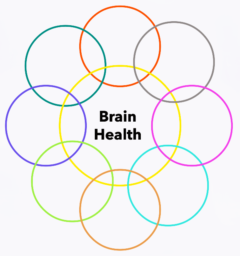
There has been a growing emphasis on proactive and personalized brain health care that goes beyond the traditional approach of waiting until symptoms of late-stage cognitive decline arise. Regular proactive brain health checkups can play an essential role in preventing or slowing cognitive decline later in life. In this post I will go over what to look for when selecting a physician, or a team of professionals, who will provide care that addresses your individual brain health needs.
What follows are some key things to consider while looking for preventive care that can help keep your brain healthy. Keep in mind that some of these approaches may not be covered by health insurance so it is important to check with your insurance company and the provider regarding coverage.
I am going to approach this from the patient’s perspective by giving you my thoughts on what to look for in a physician. I am not a physician, so while this content may be informative and supportive, it should not be used for diagnosing, examining, or treating any health issues, nor is it intended to replace the expertise and personalized care of a medical professional. This post is only for educational purposes based on my personal research and experience. See the Medical and Health Disclaimer at the bottom of this post.
Functional Medicine: A Personalized Root Cause Focus
Brain health is incredibly personal, differing from one person to another. That’s why a one-size-fits-all approach to checkups often falls short. Personalized care starts with an honest and comprehensive understanding of your own symptoms and history. Being aware of the importance of brain health and your need to take responsibility for staying mentally fit can guide you toward a physician who meets your needs. It’s vital to feel confident your physician grasps the complexities of your concerns and offers a tailored approach.
Functional medicine focuses on identifying and addressing the root causes of individual brain health issues. This approach looks at the body as an interconnected system rather than a collection of independent organs to be treated by specialists in isolation. It goes beyond treating symptoms to understanding the root causes of any conditions that may be present.
Personalized functional medicine tailors your care to individual characteristics, such as genetics, environment, and lifestyle. It delves into your unique health history, crafting specific strategies to tackle unique brain health challenges. General recommendations often miss nuances that might be crucial for you.
These personalized assessments often include questionnaires, advanced imaging techniques, and biomarker testing and analyses. Though it might seem extensive, each step is designed to uncover essential information and root causes that standard checkups might overlook. In addition to uncovering specific problems, this is also about actively working towards enhancing your brain’s overall function and resilience. Reducing stress, managing sleep, and improving nutrition might be some direct and personalized outcomes, all contributing to better brain health for you.
To find practitioners skilled in these methods, look for doctors certified in functional medicine, neuropsychiatry, neurology, or those who emphasize personalized care. Explore directories of functional medicine practitioners or seek recommendations from healthcare communities online. Ensure they have a solid track record and good reviews from patients who needed similar help.
Functional and personalized approaches can yield impressive results. Success stories often involve patients who couldn’t find relief through traditional methods. For instance, targeted nutrient therapies, personalized exercise regimens, or holistic mental wellness strategies have shown remarkable improvements in cognitive function and mental clarity.
Ultimately, this personalized focus transforms your approach to brain health from reactive to proactive. It empowers you to understand your brain better and take meaningful actions that make a difference in your daily life. A tailor-made roadmap equips you to effectively tackle and reduce your unique risks. Consider these aspects when searching for the right physician.
Multi-Domain Integrative Care
Multi-domain integrative care takes a holistic approach to maintaining and improving brain health. This approach considers the interconnectedness of different health domains—physical, emotional, social, and cognitive.
Building a multi-disciplinary care team is essential to addressing the many aspects influencing brain health. Collaborative care ensures that treatments and recommendations from various experts complement one another. This coordination reduces the risk of conflicting advice and helps maintain a consistent, effective plan tailored to individual needs.
Neurologists, nutritionists, physical therapists, and mental health professionals may collaborate to provide comprehensive care as needed. The result is a well-rounded strategy that addresses multiple facets of your health and the brain-specific considerations of each domain. For example, the brain relies on a healthy cardiovascular system for oxygen and nutrient delivery. Poor cardiovascular health, such as high blood pressure, atherosclerosis, or poor blood flow, increases the risk of stroke, vascular dementia, and Alzheimer’s disease. Another domain that plays a critical role in brain health is the gut-brain axis. Conditions such as dysbiosis, leaky gut, or chronic gastrointestinal inflammation can trigger systemic inflammation and impact brain function. Gut bacteria also produce neurotransmitters and other molecules that influence brain health.
Incorporating multi-domain integrative care into brain health checkups provides a more complete picture of your overall health. By addressing all relevant factors influencing brain health, this approach not only aims to prevent issues but actively enhances your quality of life.
Modifiable Risk Factors and Lifestyle Focus
Understanding the risk factors within your control can significantly impact your brain health. These modifiable risk factors range from dietary habits to physical activity levels. By focusing on these areas, you can take proactive steps to improve and sustain brain function.
Diet and nutrition have a powerful impact on brain health. Regular consumption of brain-boosting foods like leafy greens, nuts, and omega-3 rich fish can enhance cognitive function and protect against decline. Avoiding processed foods and sugars is equally important.
Exercise, too, plays a crucial role. Physical activity increases blood flow to the brain, supports new cell growth, and helps reduce anxiety and depression. Aim for consistent, moderate exercise to reap these benefits.
Quality sleep is another cornerstone of good brain health. Poor sleep has been linked to cognitive impairments and mental health issues. Developing good sleep hygiene, like maintaining a regular bedtime routine, can significantly improve sleep quality.
Managing stress is essential. Chronic stress can damage brain cells and contribute to mental health disorders. Techniques such as mindfulness, meditation, and deep-breathing exercises can help keep stress in check.
Avoid substances harmful to brain health. Excessive alcohol, drugs, and exposure to environmental toxins take a toll on cognitive function. Limiting or avoiding these substances can make a big difference.
Supplementing your diet with brain health supplements and nootropics is becoming popular. Substances like omega-3 fatty acids, antioxidants, and certain vitamins may enhance cognitive function. Always consult with a healthcare provider before beginning any new supplement regimen.
Early Detection and Prevention
Catching brain health issues early can significantly alter the course of treatment and improve outcomes. Early detection enables you to tackle problems before they become severe, increasing the chances of effective intervention and management. Several types of assessments help in identifying potential problems before they worsen.
One common tool is genetic testing, which can reveal predispositions to certain cognitive disorders. Knowing your genetic risks allows for proactive measures to be taken to mitigate those risks.
Advanced imaging techniques such as MRIs and CT scans offer a detailed look at brain structure. These scans can highlight abnormalities that might not yet be causing noticeable symptoms, helping doctors intervene early.
Biomarkers, another critical part of early detection, include proteins or other substances in your blood that indicate brain health issues. Regular checks for these markers can catch early signs of problems.
Routine mental health evaluations play a role, too. Cognitive tests can detect subtle changes in memory, attention, and problem-solving skills. Regular evaluations help track cognitive performance over time, allowing for timely interventions.
Proactive checkups can help you make informed decisions about lifestyle changes, diets, and mental exercises that can have long-term benefits. This holistic approach ensures that you aren’t just treating symptoms but are actually improving your overall health and quality of life.
Technological advances are making early detection even more accessible. Wearable devices that track sleep patterns, heart rate variability, and other vital signs can offer early indicators of brain health issues. Regular monitoring through these devices can catch subtle changes that traditional assessments might miss.
Early detection and intervention can be quite motivating. Many people have been able to maintain a high quality of life by addressing issues early on and adhering to preventive measures. Early intervention can be transformative by giving you a head start on taking control of your brain health.
Look for healthcare professionals who emphasize following through with you to establish a routine checkup schedule and monitor progress as a proactive way to stay on top of your brain health. Early detection combined with preventive measures creates a robust strategy for maintaining cognitive function and overall well-being.
Empowering Patients Through Education
Understanding brain health is a powerful tool. When patients are well-informed, they are better equipped to make decisions that positively impact their brain function. This empowerment comes from a structured patient education process that includes access to reliable information, resources, and ongoing support.
Educational initiatives can vary in format and include workshops, seminars, online courses, and printed materials. These resources cover a range of topics, from identifying symptoms and understanding risk factors to practical advice on lifestyle changes. This multi-faceted approach ensures that patients get comprehensive information tailored to their specific needs.
Interactive learning experiences, such as cognitive training programs and brain health apps, offer engaging ways to boost knowledge and apply it in daily life. These tools can also track progress and provide personalized feedback, making the learning process dynamic and effective.
Healthcare providers have a critical role in this educational journey. By fostering open communication, they can guide patients through their brain health concerns, answer questions, and debunk myths. This supportive interaction creates a trusting relationship where patients feel comfortable discussing struggles and seeking advice.
One of the strongest benefits of patient education is informed self-advocacy. Equipped with clear, accurate information, patients can better communicate their needs and preferences to their healthcare providers. This collaborative approach ensures that care plans are aligned with what matters most to the patient.
Education doesn’t just stop at the individual level. Educating families and caregivers about brain health can provide additional layers of support. Families often play a key role in monitoring changes, encouraging healthy habits, and providing emotional backing.
When patients understand the importance of brain health and have the resources to support it, they become active participants in their wellness journey. This sense of empowerment leads to better adherence to care plans, improved lifestyle choices, and, ultimately, a healthier brain.
Remember, you are the captain of your brain health team. Spend some time upfront evaluating healthcare professionals who understand your situation and can offer a personalized approach to meet your needs. This will likely be an incremental process requiring adjustments along the way. Also listen to what your body and mind are telling you. There is an over-abundance of advice out there, especially regarding lifestyle changes, supplements, and treatments. Look for evidence in the form of testing, assessments, and your own experience as you select strategies and evaluate their results.



